Team Experience is discussing the various Oscar categories. Here's Cláudio Alves and Nick Taylor discussing the Best International Feature Film race.
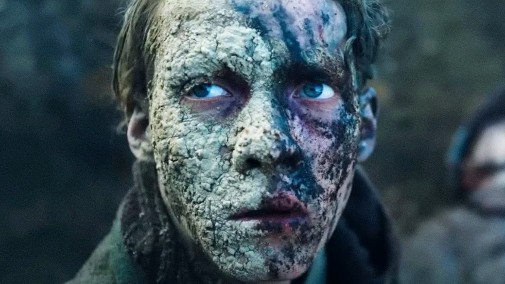
CLÁUDIO: Since the last batch of Oscar volleys in a pre-nomination world, few categories have been as shaken up as Best International Film. Back then, you could still wonder if All Quiet on the Western Front had been seen by enough people in the industry. Now, after its slew of Oscar nods and smashing BAFTA performance, it's competitive in multiple categories and expected to nab an easy victory in this one. I've already elaborated on my distaste for Edward Berger's war picture and find myself rather delighted to have been paired up with you, dear Nick, for this volley. You see, dear reader, here's someone who might dislike the movie even more than my nitpicky ass.
NICK: But I’ve softened on All Quiet a bit…
The filmmaking is wildly uneven, and I don’t love it as an adaptation, but it’s taking \risks in its style and story structure. Yes, its hopelessness is almost monotonous, it looks like it’s shot for streaming, the score is wildly dissonant to the whole project, and it takes a stronger filmmaker than Berger to make the thematically interesting peace talks work as cinema. But the violent commitment to realism in its battle scenes and the real tranquility it achieves in some passages is worth commending, and there’s plenty to admire in its mise-en-scene and sound. Besides, after finally catching up to Argentina, 1985, I have to give it credit for actually trying things.
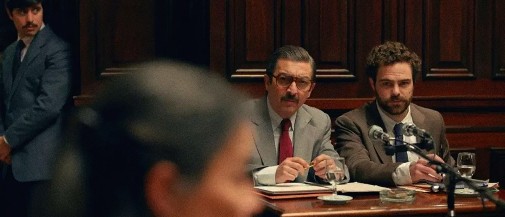
I’m guessing that you’ve started this piece by going all in on All Quiet on the Western Front because you think it’s the easy frontrunner to win this prize? If so, I would agree. I maybe don’t believe its wild success with BAFTA will fully translate across the pond, but it’s a dark horse in most (if not all) of the categories it’s nominated it. I still remember way back when the Globes originally aired and Argentina, 1985 somehow won Foreign Language Film - does that mean it's the runner up? Or is there room for a sneak attack?
CLÁUDIO: I fully expect All Quiet on the Western Front to win this prize, maybe a couple of other Oscars to go along with it. Cinematography feels like a safe bet, and Adapted Screenplay may repeat after the BAFTA victory. Like you, I'd guess Argentina's entry to be the runner-up, if nothing else, because the Academy seems focused on rewarding mediocrity above all else in its international race. At least, that's their mood this year.
Seriously, what is this lineup? It's like the voters picked the most uninspired possible set of nominees from what appeared to be a promising shortlist. As much as I love Poland's EO, more is needed to make up for the triple threat of All Quiet/Argentina/Close. At least Ireland's The Quiet Girl offers some middle ground, though it feels like the title least likely to gather enough supporters for a win. Then again, AMPAS is positively crazy for the Irish this season, which may result in more eyes falling on the small indie. Do you think the Banshees-Mescal mania will boost the country here, or am I reaching?
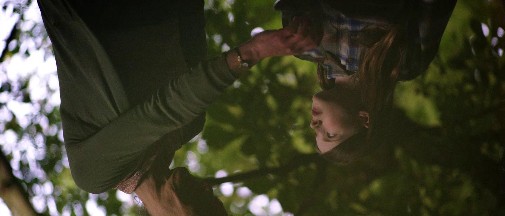
NICK: Oh you’re 100% reaching. That being said, I’m very happy for The Quiet Girl, which I fully expected to get swallowed up in this race by buzzier, more extroverted films. It’s easily my runner-up of this group, and I think what it so delicately pulls off in its lighting and emotional tenors might be taken for granted given how heartwarming/heartrending the story is. Instead, it’s in a group that categorically has very little to say except the one thing they each mean to say, and arguably even less to ask of their audiences. What questions would one have walking out of Argentina, 1985? What ambiguities are there left to ponder in All Quiet on the Western Front?
Close’s bifurcated structure means it has two things to say, but the second half strikes me as markedly less layered than the first. Maybe I can’t argue for The Quiet Girl as provocative cinema at the level of a Joyland or Saint Omer, but as you say, it’s a middle ground of above-average thoughtful sensitive filmmaking.
Still, EO is so clearly the peak of this field that I want to talk about only it for a minute. None of its fellow nominees take the kinds of risks with form and point-of-view. The cinematography alone, a year’s-best peak by Michal Dynan, is tremendously expressive in color and movement without being prescriptive about how we should be experiencing whatever it is we’re seeing, relative to any sort of subjective or objective eye. True, EO’s story is arguably the most simple and direct of this lineup, but the tones and incidents director Jerzy Skolimowski throws at us are scary, wondrous, and always surprising, even as the final scene is the one this film was always heading towards. A shame the humans are so dull, but the donkeys are more charismatic figures than poor Ricardo Darín is ever allowed to be.
CLÁUDIO: I share a lot of your admiration for The Quiet Girl, which would make my Best Adapted Screenplay ballot. Still, I appreciate that we agree on EO's clear superiority over its competition.
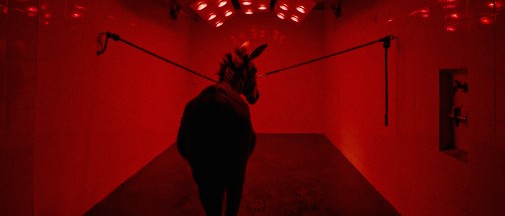
Furthermore, while the story might be simple, it works as a strong skeleton whereupon Skolimowski and his team of inspired creatives can produce a singularly cinematic experience. Compare it to the pat perfunctory nature of Argentina, 1985, and you'll find a masterpiece of bold structuring. Compare it to Close's utter dependence on demonstrative emotion and acting as a means of communication, and you get to appreciate a film where the camera is the dominant element of expressivity. Compare it to All Quiet on the Western Front's blinkered focus, and you notice just how open EO is to interpretation, how it offers audiovisual plasticity while still allowing the audience to formulate a fluid dialogue with its screen stimuli. Compare it to The Quiet Girl's deliberate meekness, and you appreciate how audacious the octogenarian Polish auteur truly is.
So, because I'm always a relative pessimist regarding predictions, I should accept that EO will get close to 0% of the votes. In a year when AMPAS seems ready to support the oddities of Everything Everywhere All At Once in Best Picture, it falls back on convention in its appreciation of international cinema.
Do you want to keep talking about this sorry batch of nominees, or can we move on to a eulogy for the unnominated greats?
NICK: Surely Close and Argentina, 1985 deserve a little more airtime, or at least a moment to devote to why we’re so dismissive of them instead of firing potshots while we gush about donkeys. Then again, I don’t have all that much to report on Argentina, 1985, which tells an undeniably compelling story and has some affecting scenes. It’s also by far the least aesthetically ambitious film in this lineup. I don’t know what it actually has to say about this trial beyond “this was a good thing that happened, and the work that went into make this happen was important!” They’re right, but is that a credible artistic POV? It’s not even that remarkable as a history listen.
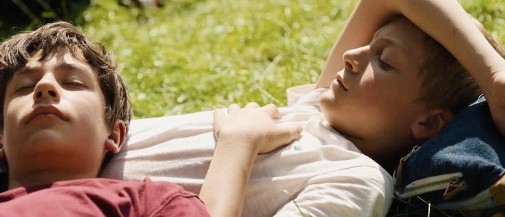
Close, at least, has a lot going for it in its performances. Eden Dambrine and Gustav de Waele deliver two of the year’s best performances, and Rosetta’s Emilie Dequenne is pretty tremendous as de Waele’s mother. The breakdown of the boy’s relationship is pretty gutting, though I’m firmly in the camp that believes a better movie would have either pushed back or removed the mid-film twist entirely.
There’s too many meaningful silences that the actors have to carry without a clear sense of direction. I intellectually “get” that as the film is embodying grief-stricken dislocation but it still doesn’t play dramatically. The mix of open-faced emotionality and opacity throughout - are either of the boys queer, and would an answer make their choices more or less upsetting? Is the one boy not processing his grief, or is he pushing through other feelings too? - are interesting, but maybe not interesting enough. And the increasing prominence of the score costs a whole letter grade.
CLÁUDIO: When reviewing it for my Best International Film coverage, I've already said plenty about Close when we were still waiting for the shortlists. So, let's say I cosign all of your points, both the positives and negatives. Add to them that a better understanding of the people's relationship to the spaces they inhabit would have made some moments hit harder. Sadly, Dhont's shallow-focus hand-held approach robs the picture of spatial awareness, zeroing in on the performers with scarce variation. There are also editing issues that make for an insular experience, perhaps replicating the effects of grief but also blocking us from understanding the extent of the interpersonal connections tying the characters together. I would rather have seen the film nab two or three acting nominations than this International Film honor.
As for Argentina, 1985, I am disappointed with what could have been an engaging procedural. As it stands, the historical premise is bogged down by the forcefulness with which the script tries to center one singular protagonist to the detriment of the collective tale. Director Santiago Mitre seems weirdly timid in his formal approach, too. He settles on something so televisual that it could have been a pastiche of 1980s mainstream courtroom dramas. The worst of all – even worse than the wasted opportunities – is that score which annihilates any hope for tonal complexity, flattening passage after passage up to the misguided ending.
Comparing it to another contender that got into the shortlist but didn't win a nomination illuminates how willfully naïve Mitre's film remains about the institution at its center. Saint Omer's complicated feelings about the judicial system, even the courtroom space, felt much closer to visceral and intellectual reality than what Argentina presents. Now there's a formally audacious project, an engaging courtroom drama, a performance showcase, and a bracing challenge to the spectator. It feels wrong to argue for one more French nomination to the detriment of one rare recognition of Latin American cinema, but here we are.
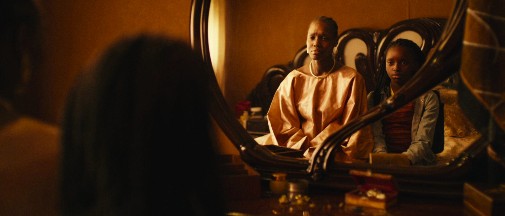
NICK: Saint Omer! Where is she. She deserves her laurels.
I saw 12 of Oscar’s finalists, and aside from Saint Omer, my favorite film that ultimately missed the lineup was Davy Chou’s Return to Seoul. The film was Cambodia’s submission, though it could plausibly have represented three other countries, and marks the first time Cambodia was shortlisted since Rithy Pahn’s The Missing Picture in 2013. I never really expectedsuch a mesmerizing, prickly, quietly audacious character study to make the final line-up. Park Ji-min’s performance is as good or better than any acting nominee this year. The intimacy with which she and Chou guide her character - a young woman adopted in France who’s finally visiting South Korea with the hope of finding her birth family - through the many decisions she makes, as well as the ones made for and about her, is truly astonishing. It’s so wise about the way people can live up to and disappoint each other. I might go put it on right now.
CLÁUDIO: Return to Seoul is brilliant indeed, the kind of film that would be a lock for Actress and Screenplay honors if the world of awards was just. Speaking of that fantasy universe I'm picturing, Pakistan's shortlisted Joyland would have been another obvious nominee for its rhapsodies of empathetic storytelling, sharp social observations, and drop-dead gorgeous lensing. There's also Alcarràs from Spain, which didn't make the shortlist but is, to my mind, a close runner-up behind Saint Omer for the title of Best International Film of 2022.
Still, one doesn't need to go beyond the shortlist to come up with a formidable lineup. So lose everything but EO, add Saint Omer, Return to Seoul, Joyland, and South Korea's Decision to Leave for good measure – an all-timer ballot if there ever was one. I'm so disappointed with the Academy I could scream.
NICK: It would’ve been so good! Also, RRR absolutely would have been here if India had selected it, right? Is that a no-brainer? Okay, we should stop now before we just keep listing movies. I predict All Quiet on the Western Front will win, but I’m gonna amuse myself and pick EO as the spoiler for brevity, creativity, chutzpah, and for all that glorious ass. Your move, Academy!
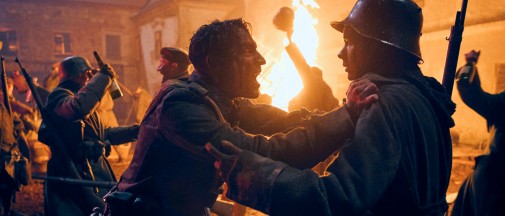
RELATED: